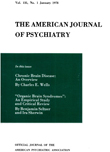A "DOUBLE BLIND" STUDY COMPARING RO 4-0403, TRIFLUOPERAZINE AND A PLACEBO IN CHRONICALLY ILL MENTAL PATIENTS
Abstract
1. RO 4-0403 (Taractan) produced a beneficial response in 7 of a group of 30 extremely chronic psychotic patients. Those patients who responded showed a decrease in agitation, appeared more friendly and expressed the subjective sensation of "feeling better." Undesirable side effects were observed in only 2 of the 30 patients treated. From these results it would appear that this compound can be safely and effectively used in acute psychiatric disorders.
2. Trifluoperazine (Stelazine) is a potent drug that is effective in reducing the symptomatology in chronic psychotic patients. In this study more than half the patients who received trifluoperazine showed a desirable change of behavior during the study but side effects were noted in 40% of those treated. These side effects usually appeared at a high dosage and disappeared promptly after the administration of anti-Parkinsonian drugs.
3. Since only 1 patient out of 30 showed a slight improvement while receiving a placebo, it is presumed that suggestion and attention were of minimal importance in producing the changes observed with the active compounds.
Access content
To read the fulltext, please use one of the options below to sign in or purchase access.- Personal login
- Institutional Login
- Sign in via OpenAthens
- Register for access
-
Please login/register if you wish to pair your device and check access availability.
Not a subscriber?
PsychiatryOnline subscription options offer access to the DSM-5 library, books, journals, CME, and patient resources. This all-in-one virtual library provides psychiatrists and mental health professionals with key resources for diagnosis, treatment, research, and professional development.
Need more help? PsychiatryOnline Customer Service may be reached by emailing [email protected] or by calling 800-368-5777 (in the U.S.) or 703-907-7322 (outside the U.S.).



